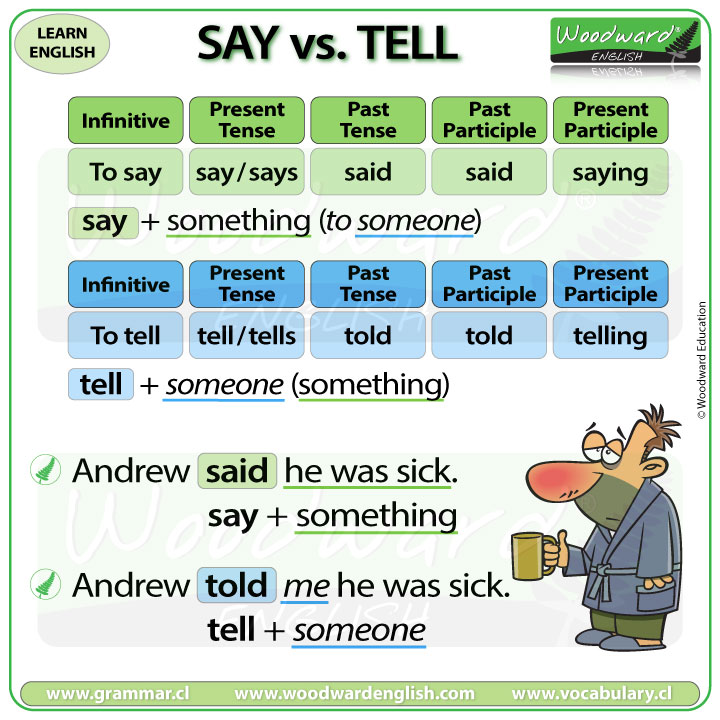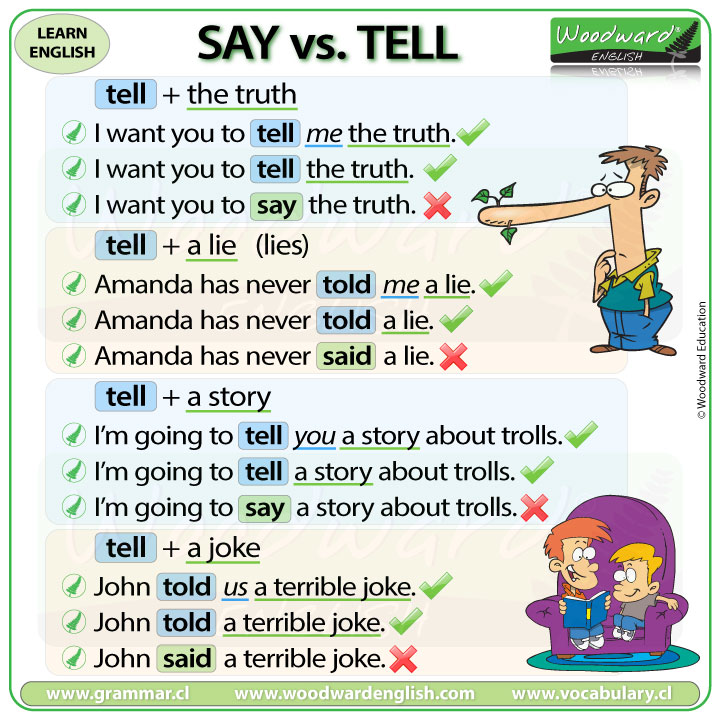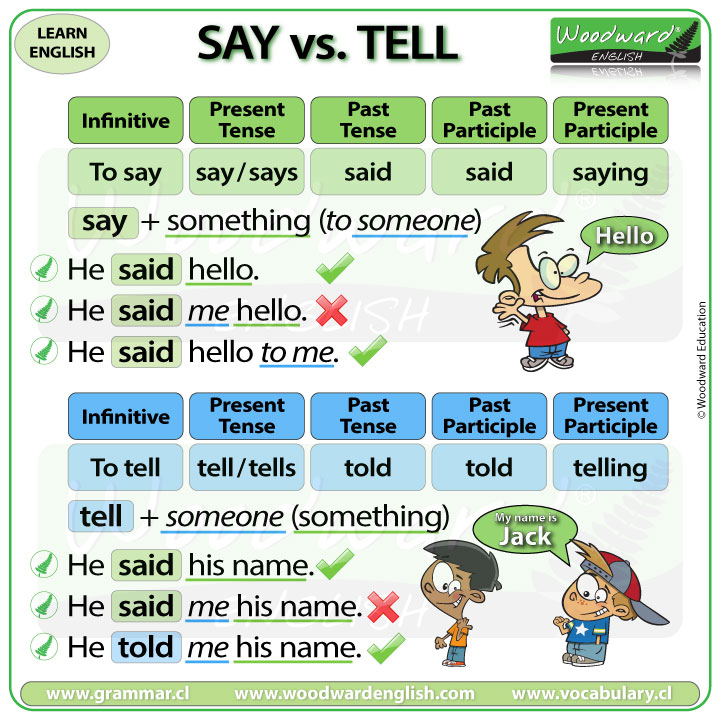The difference between SAY and TELL in English
- Andrew said he was sick.
- Andrew told me he was sick.
In general:
Say + something
Tell + someone
Let’s look at each verb in more detail…
SAY
Say = to express something in words.
You say SOMETHING
Say is an irregular verb:
Infinitive: to say
Present tense: say / says (Be careful with the pronunciation of says: /sez/)
Past tense: said
Past participle: said
Present participle: saying
For example
- He said hello.
He said something… hello is that “something”
NOTE: You cannot say: He said me hello. (NOT correct)
Say does not have an object pronoun directly after it (me, him, her, us, etc.)
You can say something (to someone)
- He said hello to me.
Example Sentences with SAY
Remember, it is SAY + SOMETHING
- How do you say ‘chicken’ in Spanish?
- I said goodbye to him.
- We didn’t say anything.
- Cecilia was saying the same thing.
- They didn’t say what was wrong
TELL
You tell SOMEONE (something)
Tell is an irregular verb:
Infinitive: to tell
Present tense: tell / tells
Past tense: told
Past participle: told
Present participle: telling
Look at this sentence.
- He said his name.
He did not say his name to a specific person. We do not know who the listener is.
What if he is talking to me?
We cannot say: He said me his name. (This is NOT correct)
You TELL someone something. So it becomes:
- He told me his name. (This is correct)
Let’s look at some example sentences:
- She told me her name.
- He told us his secret.
- Can you tell me the time please?
- The teacher told them to put their books away.
Did you notice how there is a verb instead of a thing in the last sentence?
You tell SOMEONE to do something.
(The second verb is in the infinitive …. TO + verb)
This is usually a command or for instructions. For example:
- I told Steve to be quiet.
- They told my sister to turn her music down. (Turn down = to reduce the volume)
Tell can be used with wh-words (where, whn, what, also how)
The order is…
Tell + someone + (where/when etc.) + verb
- They told us where to find the hotel.
- He told me how to fix my computer.
- Can you tell me when you are ready?
- I told you what happened.
Tell can be used with or without an object pronoun in the following cases:
– Tell + the truth
- I want you to tell me the truth.
- I want you to tell the truth.
- I want you to say the truth. (NOT correct)
– Tell + a lie (lies)
- Amanda has never told me a lie.
- Amanda has never told a lie.
- Amanda has never said a lie. (NOT correct)
– Tell + a joke
- John told us a terrible joke.
- John told a terrible joke.
- John said a terrible joke. (NOT correct)
– Tell + a story
- I’m going to tell you a story about trolls.
- I’m going to tell a story about trolls.
- I’m going to say a story. (NOT correct)
Said or Told?
Compare these two sentences:
- Jack said that he would be late.
- Jack told me that he would be late.
In the first sentence we don’t specify exactly WHO he was talking to. He just said something. The listener is not important.
In the second sentence we specify that he said this to ME, so we need the verb TOLD. The listener is specified.
So the basic rule is:
Say + something
Tell + someone
Say vs. Tell Exercises
Complete these sentences with SAID or TOLD:
- Julie _____ me that she has a new job.
- Julie _____ that she has a new job.
- We _____ we were going to be late.
- I think he has just _____ a lie.
- Our boss _____ us to work from home.
- They _____ that they were busy.
The answers appear in the video at the top of this lesson.
I hope you found this lesson about the difference between SAY and TELL useful.
Say vs. Tell Summary Chart
«This is where the station is» said Klara. (explain, using question word + clause)
Klara explained where the station was.
«Watch out for the weak bridge» he said.
He warned us about the weak bridge.
«I’ll leave at six pm!» John said. (decide + clause)
John decided that he would leave at six pm.
«This is how we use the present perfect» said Amy. (explain + question word + infinitive)
Amy explained how to use the present perfect.
«The class will start later on Tuesdays» said the teacher to us. (explain + clause)
The teacher explained to us that the class would start later on Tuesdays.
«Don’t cross the road there» she said to the children. (warn, using infinitive)
She warned the children not to cross the road there.
«I’ll go to France on holiday» said John. (decide, using infinitive)
John decided to go to France on holiday.
«You should apply for the job» said Jack to Stella. (encourage)
Jack encouraged Stella to apply for the job.
«Don’t forget that Lucy needs to go to the dentist» she said to me. (remind, using clause)
She reminded me that Lucy needed to go to the dentist.
«I’ll study really hard for the exam» said Luke. (promise + to + infinitive)
Luke promised to study really hard for the exam.
«It’s a great idea to go to the beach» said Maria. (recommend + verb-ing)
Maria recommended going to the beach.
«You shouldn’t go into the water» said the coast guard. (advise against)
The coast guard advised against going into the water.
«I’m sorry I forgot your birthday» said Amanda to me. (apologise)
Amanda apologised for forgetting my birthday.
«Right, let’s buy the car in the morning!» we said.
We agreed to buy the car in the morning.
«How about having Indian food?» I said. (suggest, using verb-ing)
I suggested having Indian food.
«I’ll be early» I said to my mother. (promise + clause)
I promised my mother that I would be early.
«Don’t forget to buy milk!» said Antonio to Lucia. (remind, using infinitive)
Antonio reminded Lucia to buy milk.
1 ‘We’ll be travelling round Europe next month,’ said Jerry. following
Jerry said that ……………………………………………… be travelling round Europe.
2 ‘I had Evan and Christie over for dinner last night,’ said Liz. before
Liz said that ……………………………………………… had Evan and Christie over for dinner.
3 ‘Daz came here two days ago and then suddenly left,’ said Barry. gone
Barry said that Daz had ……………………………………………… and then suddenly left.
4 ‘We’re going on our yearly diet tomorrow,’ said Jessie and Sandy together. starting
Jessie and Sandy said together that ……………………………………………… yearly diet the next day.
5 ‘I can pick you two boys up from school this afternoon,’ said their father to George and Kevin. that
George and Kevin’s father told his sons ……………………………………………… up from school that afternoon.
6 ‘I’ll buy these as they’re so cheap!’ said Toby. going
Toby said he ……………………………………………… as they were so cheap.
7 ‘You must study harder, Dave,’ said Dave’s mum. him
Dave’s mum ……………………………………………… study harder.
8 ‘I think you may be coming down with flu,’ Greg said to me. thought
Greg said that ……………………………………………… be coming down with flu.
9 ‘I don’t know why they haven’t contacted me recently,’ said Tine. been
Tine said she didn’t know why ……………………………………………… recently.
10 ‘Everything was different yesterday,’ said Ben. been
Ben said everything ……………………………………………… before.



